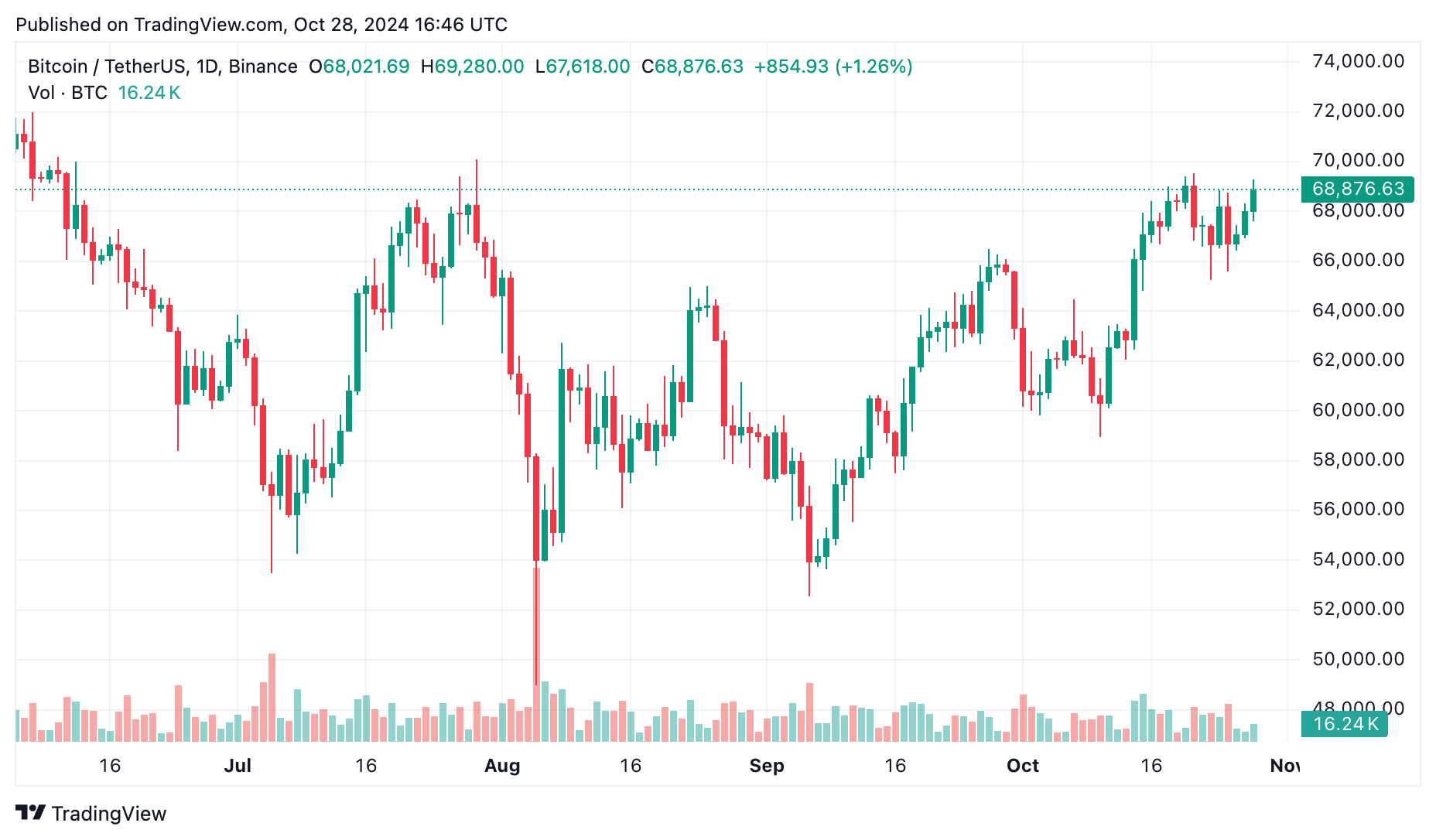Will November’s Rate Cuts and Election Push BTC Past $100K?
10/29/2024 00:02
Could November’s packed calendar, including the election and rate cut, solidify Bitcoin’s dominance or bring new volatility into the market?
Will Bitcoin’s near-60% dominance surge translate into a breakout above $100K with the help of November’s market-shaping events, or will unexpected factors derail BTC’s upward journey?
BTC dominance holds strong amid market shifts
As autumn peaks, Bitcoin’s (BTC) market dominance—the percentage of the total crypto market cap it holds—is creating an intriguing scenario. Currently, at around 59.7%, a level last reached in April 2021, it appears set to cross the 60% threshold.
As of Oct. 28, Bitcoin’s price has risen by nearly 2.5% in the past 24 hours, pushing it to around $69,000. Now, it’s inching closer to the $70,000 milestone — a “psychological resistance” level that could shape market sentiment.

This rise in Bitcoin’s dominance supports the idea that we’re in a “Bitcoin Season.” The Altcoin Season Index, which currently sits at a low of 25, shows that only 25% of the top 100 non-stablecoins have outperformed Bitcoin in the last three months. On this scale of 1 to 100, a score of 25 or below signals Bitcoin Season.
What’s particularly interesting is that this surge in Bitcoin’s dominance aligns with some major upcoming events. First, the U.S. presidential election on Nov. 5 could be monumental for crypto.
Furthermore, just two days after the election, the Federal Reserve will meet for its next policy review on Nov. 7. Speculators using the CME FedWatch Tool are almost certain of a 25 basis point rate cut, with a 97% probability.
With Bitcoin’s dominance pushing toward 60% and these key catalysts on the horizon, let’s explore the market’s current pulse and what experts forecast for Bitcoin and the broader crypto ecosystem.
BTC ETFs closing in on major milestones
With November’s calendar packed with market-shifting events, Bitcoin ETFs are nearing a milestone that could further solidify Bitcoin’s standing in the financial ecosystem.
As U.S. spot Bitcoin ETFs approach a combined 1 million BTC holdings, traders are eyeing potential tailwinds to drive the market higher.
Currently, these ETFs hold around 977,000 Bitcoin, valued at approximately $67.4 billion — about 5% of Bitcoin’s total market cap of $1.36 trillion.
Reaching the one-million BTC milestone would signal an unprecedented level of institutional engagement and could serve as a catalyst for additional price momentum.
Nate Geraci, President of ETF Store, estimates that an influx of around $1.5 billion would allow these funds to acquire the extra 23,000 BTC needed to reach this historic threshold.
This milestone could be achieved as early as this week if ETFs maintain an average of $300 million in daily inflows.
Recent inflows — around $3 billion in just the last two weeks, according to Bitcoin analyst Alessandro Ottaviani — have led many analysts to predict that Bitcoin could reach new all-time highs if this momentum persists through November.
— Alessandro Ottaviani (@AlexOttaBTC) October 27, 2024In the last two weeks we had $3B net inflow from the Bitcoin Spot ETFs.
If this pace continues through November, ATH will be inevitabile
In addition, the Fed’s upcoming Federal Open Market Committee meeting will address a potential 25 basis point rate cut. Should this rate cut proceed, it could inject fresh liquidity into the market, potentially boosting Bitcoin’s upward momentum.
On the international front, Russia is set to lift its ban on Bitcoin mining on Nov. 1, reflecting a broader trend of governments easing crypto restrictions, which could further bolster Bitcoin’s appeal and add stability to its network.
Altogether, these favorable developments may lay the groundwork for Bitcoin’s next major move.
Election odds and what they mean for Bitcoin’s future
With the U.S. presidential election just days away, the crypto community is assessing the potential impact of each candidate’s victory on Bitcoin.
According to Polymarket, a popular prediction platform, Republican Donald Trump leads with a 66.1% chance of winning, backed by $720.9 million in bets, while Democrat Kamala Harris has a 33.9% chance, with $456.1 million wagered on her victory.
Similarly, Kalshi’s data places Trump’s odds at 62% and Harris’s at 38%.
However, polling data from the New York Times offers a contrasting view: Harris holds a narrow national lead with 49% support compared to Trump’s 48%, marking her slimmest lead since August, according to Nate Cohn, the Times’ chief political analyst.
The race remains exceptionally close, with seven swing states likely to tip the balance. Even slight polling shifts could see either candidate sweeping these battlegrounds, making the final result uncertain.
Trump’s crypto-friendly promises, including his pledge to be a “crypto president,” have fueled hopes for favorable policies that might encourage Bitcoin investments.
In contrast, a Harris win may introduce volatility due to her more cautious stance on digital assets, leaving investors uncertain about the regulatory landscape.
As both outcomes remain possible, the market seems poised for short-term reactions once the winner is announced.
Crypto and macro perspective
With Bitcoin positioned strongly near $69,000, market watchers are buzzing about its future trajectory, especially with macro events on the horizon.
Crypto analyst Michaël van de Poppe has highlighted that Bitcoin’s current trading range has held steady for the longest period since 2016 and 2020. He sees this eight-month consolidation as the calm before the storm.
— Michaël van de Poppe (@CryptoMichNL) October 27, 2024The #Bitcoin range has been staying in place for eight months.
The longest consolidation period since 2016 & 2020.
I think we’ll break out in the next 2 weeks & see #Bitcoin at $90,000-100,000 around NYE.
According to van de Poppe, a breakout could push Bitcoin to new highs, with a potential price of $90,000 to $100,000 by the end of the year if momentum holds.
One major pattern that has analysts excited is Bitcoin’s “Cup & Handle” formation, which has been forming over the past 3.5 years.
— 𝕄𝕠𝕦𝕤𝕥𝕒𝕔ⓗ𝕖 🧲 (@el_crypto_prof) October 28, 2024That's what you want to see.$BTC successfully closed yesterday's weekly close above the handle low.
This Cup & Handle is 3.5 years in the making!
US elections next week. Somehow it all fits together perfectly.👀🔥
Probably nothing. pic.twitter.com/jcXddRL76N
Titan of Crypto considers this pattern a bullish indicator, suggesting that Bitcoin could rally to a target of $110,000. He described this setup as signaling a “big move ahead.”
Beyond technical patterns and price targets, the macroeconomic backdrop could be a key driver of Bitcoin’s direction.
Van de Poppe suggests that this cycle may deviate from the usual 4-year market rhythm. With interest rates falling and governments increasing liquidity—China being a prime example—he argues that Bitcoin’s growth potential might extend longer than expected.
— Michaël van de Poppe (@CryptoMichNL) October 27, 2024This 'Uptober' and the previous 'Rektember' have shown that this cycle is more complex and different than the previous cycles.
I think that this is the cycle we'll get rid of the 4-year cycles.
It's all depending on liquidity and interest rates.
If those keep falling and…
He adds, “If those [rates] keep falling and governments continue to print money,” Bitcoin’s peak might not arrive until 2026.
However, the bullish sentiment comes with necessary warnings.
Bitcoin analyst Ali notes that for an upward rally to materialize, Bitcoin must maintain its support level at $65,000. If it does, he predicts a potential rise to $72,000, followed by a brief pullback before another rally toward $78,000.
In short, while market indicators and the macro landscape support a bullish case, the potential for volatility—especially with the U.S. election and upcoming Fed decisions—shouldn’t be underestimated.
A word of caution remains: though the market leans bullish, Bitcoin’s path is never without surprises. Trade wisely, and never invest more than you can afford to lose.
Disclosure: This article does not represent investment advice. The content and materials featured on this page are for educational purposes only.